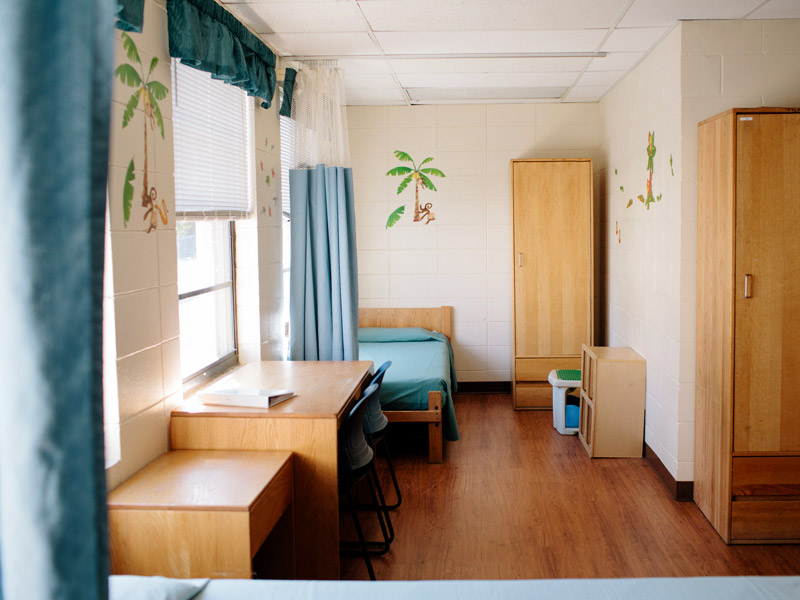Learn about the side effects, causes, signs and symptoms of autism. Millcreek of Magee Treatment Center offers the best residential treatment and home-based programs for children & adolescents struggling with autism.
Understanding Autism
Learn more about autism
When a child or adolescent presents with cognitive and social deficits, engages in repetitive behaviors, and has a great deal of difficulty adjusting to circumstances due to rigid thinking, he or she is most likely suffering from an autism spectrum disorder. Symptoms of these conditions can vary in severity. Some individuals with an autism spectrum disorder may require a great deal of assistance caring for themselves, while others can function well in most situations. Additionally, autism spectrum disorder symptoms typically become apparent during early childhood, as one of the initial signs of these conditions can be a failure to meet developmental milestones.
While some individuals with these conditions may have a higher intelligence quotient (IQ) and appear to function well in most settings, these individuals may require support in developing social or occupational skills. The key thing to know is that a diagnosis of an autism spectrum disorder does not mean that a child will fail to thrive in a manner that will permanently hinder functioning as an adult. Treatment for autism spectrum disorders is available and can greatly improve the lives of those who have are diagnosed. And while there is no cure for autism spectrum disorders, appropriate care can reduce the severity of symptoms and allow a child or adolescent to lead a happy, healthy life.
Statistics
Autism statistics
Research on the prevalence of autism spectrum disorders had found that these conditions affect more male children and adolescents then female children and adolescents, with statistics showing that 1 in 42 boys present with symptoms synonymous with an autism spectrum disorder. In terms of prevalence among males and females, the Centers for Disease Control and Prevention (CDC) estimates that 1 in 68 young people under the age of 18 meet diagnostic criteria for an autism spectrum disorder.
Causes and Risk Factors
Causes and risk factors for autism
While more research on autism spectrum disorders needs to be done, child development specialists agree that a number of influences can cause an autism spectrum disorder to be present. Consider the following explanations when trying to understand the causes and risk factors for autism spectrum disorders:
Genetic: Extensive research on the genes of those with an autism spectrum disorder has led to the discovery of more than one hundred genes that contribute to the eventual manifestation of autism spectrum symptoms. Additionally, children with a biological sibling who has an autism spectrum disorder are at a greater risk for also showing signs of one of these disorders. Because of these two findings, it can be deduced that autism spectrum disorders possess a genetic component.
Physical: Developmental specialists have discovered that the development of an autism spectrum disorder can occur when healthy brain development is stunted or impaired when a child is in utero. When the development of a child’s brain is adversely affected before birth, cognitive deficits can occur, of which are cornerstone to some autism spectrum disorders.
Environmental: The onset of an autism spectrum disorder can be influenced by certain environmental factors. Experts in the field of mental health have concluded that being born prematurely or enduring complications during birth can render a child more susceptible to an autism spectrum disorder. Furthermore, research has found that exposure to certain infections, pollutants, toxins, or pesticides before a child is born can cause that child to eventually display signs of one of these mental health conditions.
Risk Factors:
- Being male
- Having parents of advanced age
- Complications during birth
- Prenatal exposure to pesticides
- Maternal illness during pregnancy
- Low birth weight
- Fetal exposure to valproate (medication prescribed to treat seizures or mood disorders)
- The presence of certain health conditions, such as Fragile X syndrome, tuberous sclerosis, muscular dystrophy, Down syndrome, Rhett syndrome, and cerebral palsy
Signs and Symptoms
Signs and symptoms of autism
Depending on the type of autism spectrum disorder present, the signs and symptoms of these conditions can vary. Additionally, the severity of the disorder’s symptoms can also affect the obviousness that a child or adolescent is battling an autism spectrum disorder. It is imperative to note the presence of any and all symptoms that you observe and seek care for your child if you suspect that he or she is struggling with one of these mental health conditions:
Behavioral symptoms:
- Self-harming behaviors
- Not meeting language milestones
- Not responding when being called
- Engaging in repetitive behaviors
- Turning away when others attempt to touch him or her
- Monotonous speech patterns
- Emotional outbursts in inappropriate situations
- Physically aggressive outbursts
Physical symptoms:
- Sleep disturbances
- Hypersensitivity to sounds
- Hypersensitivity to touch
- Flat affect
- Lack of coordination
Cognitive symptoms:
- Inability to interpret social cues
- Ruminating thoughts
- Developing fixations on objects or activities
- Hindered ability to organize
Psycho-social symptoms:
- Anxiety
- Low self-esteem
- Lack of emotional expression
- Unwillingness to cooperate
- Drastic shifts in mood
- Inability to adjust to change
Effects
The effects of autism
Young people who do not receive treatment to improve the social and cognitive deficits that are associated with autism spectrum disorders could experience adverse effects as a result. The following effects are examples of things that can take place when care is not afforded to these youth:
- Development of another mental health condition
- Decreased ability to care for oneself
- Loss of verbal skills
- Social isolation
- Difficulty forming and maintaining relationships with others
Co-Occurring Disorders
Autism and co-occurring disorders
Children and adolescents with autism spectrum disorders frequently battle symptoms of other mental illnesses at the same time. Because of this, it is common for a young person to receive an autism diagnosis in addition to that of another mental health condition or conditions. Listed are examples of such conditions that are known to occur alongside an autism spectrum disorder:
- Generalized anxiety disorder
- Intellectual disability
- Depressive disorders
- Obsessive-compulsive disorder
- Social anxiety disorder



